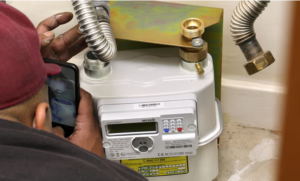Consumer campaigner writes to Ed Miliband warning that installations are being prioritised over repairs

Martin Lewis wants suppliers to be incentivised to fix faulty meters as well as installing new ones. Photograph: Ron Bull/Alamy
Energy customers are being short-changed by “perverse” government targets to install electronic smart meters in homes across the UK, according to the consumer campaigner Martin Lewis.
Lewis, the founder and chair of MoneySavingExpert.com (MSE), has written to Ed Miliband, the secretary of state for energy security and net zero, warning that installations are being prioritised over repairs, leaving thousands of households facing shock bills because their meters have malfunctioned.
Last December, the artist Grayson Perry reported that his monthly electricity charge had soared from £300 to £39,000 because of a faulty smart meter. Lewis wants suppliers to be incentivised to fix faulty meters as well as installing new ones.
“I am writing to you […] to warn of the brand damage that risks making the government’s targets framework perverse,” Lewis said in his letter. “A rethink is needed – specifically I’d suggest shifting firms’ targets from smart meter installations to the overall number of ‘working’ smart meters, which would incentivise firms to do both installations and repairs.”
Smart meters record energy consumption, display costs in real time and submit regular readings to energy firms. The government expects them to be installed in 74.5% of homes by the end of 2025, with the estimated overall £13.5bn cost funded by suppliers and recouped in consumer bills.
However, the rollout, originally intended to be completed in 2019, has been beset with problems. Nearly 4m smart meters are malfunctioning in the UK, leaving some householders facing life-changing bills, according to figures released by the Department for Energy Security and Net Zero (DESNZ) earlier this year.
Lewis said the DESNZ figures did not reflect the full extent of the problem. “The government’s estimate of how many domestic smart meters are not working is about 10%. Yet this only includes the narrow definition of smart meters … not sending automatic readings to the supplier,” he wrote.
“Our latest MSE research … shows 19% say theirs don’t work. The reason this is so much higher is that it includes … in-home displays that won’t communicate or connect, incorrect data on tariffs or usage, and prepay top-ups that don’t register correctly. Repairs are slow, if they happen at all, as resources are focused on installs, leaving consumers frustrated and at risk of misbilling and further problems.”
Until this year customers had to pay to fix any problems that occurred after their year-long warranty expired. In February, Ofgem launched a new scheme that committed participating suppliers to repairing them for free, but not all firms have signed up.
A report by the House of Commons public accounts committee found that suppliers were prioritising new installations over repairs in order to meet rollout targets. Current rules only oblige firms to take “all reasonable steps” to repair or replace faulty meters, whereas there are binding targets for new installations and stiff penalties if these are missed.
Lewis said poor planning had undermined an important strategy towards net zero. “Smart meters, done right, offer an exciting future that should benefit energy security and enable innovative tariffs that can diminish peak usage, by incentivising people to shift usage to times when renewables are dominant – all of which should cut consumer costs,” he said. “It’s just a shame the overly long history of the smart meter rollout is one of sloth, poor decisions, poor technology and overexpense.”
The DESNZ was approached for comment.
